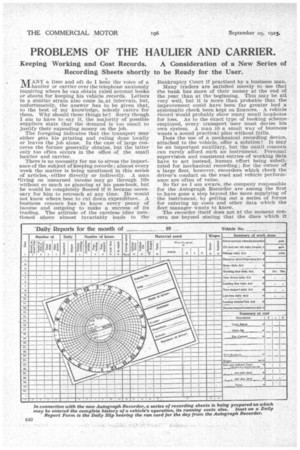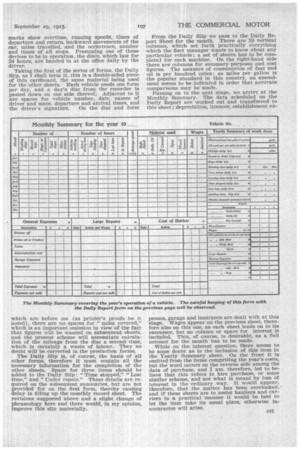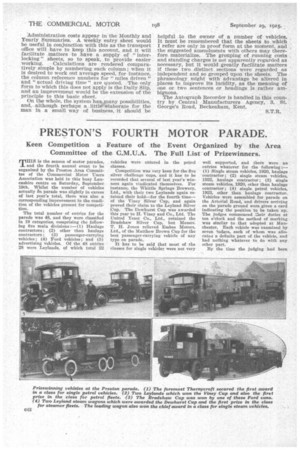PROBLEMS OF THE HAULIER AND CARRIER.
Page 24

Page 25

Page 26

If you've noticed an error in this article please click here to report it so we can fix it.
Keeping Working and Cost Records. A Consideration of a New Series of Recording Sheets shortly to be Ready for the User.
iur ANY a time and oft do I hear the voice of a .1V-Lhaulier or carrier over the telephone anxiously Inquiring where he can obtain ruled account books or sheets for keeping his vehicle records. Letters in a similar strain also come in, at intervals, but, unfortunately, the ansWer has to be given that, to the best of my knowledge, nobody eaters for them. Why should these things be? Sorry though I am to have to say it, the majority of possible suppliers state that the demand is too small to justify their expending money on the job.
The foregoing indicates that the transport user either gets his printing and ruling done locally or leaves the job alone. In the case of large concerns the former generally obtains, but the latter only too often occurs in the office of the small haulier and carrier.
There is no necessity for me to stress the importance of the subject of keeping records ; almost every week the matter is being mentioned in this series of articles, ,eitlier directly or indirectly. A man *living on unearned income may go through life without so much as glancing at his pass-book, but he would be completely floored if it became necessary for him to retrench at any time. He would not know where best to cut down expenditure. A business concern has to know every penny of income and outgoing to make a success of its trading. The attitude of the careless idler mentioned above almost invariably leads to the
Bankruptcy Court if practised by a business man.
Many traders are satisfied merely to see that the bank has more of their money at the end of the year than at the beginning. This may be all very well, but it is more than probable that the improvement could have been far greater had a systematic check been kept on finances. A vehicle record would probably show many small loopholes for loss. As to the exact type of booking schemeemployed, every transport user must devise his own system. A man in a small way of business wants a sound practical plan without frills.
Does the use of a mechanical recording device, attached to the vehicle, offer a solution? It may be an important auxiliary, but the small concern can rarely afford such an instrument. Personal supervision and consistent entries of working data have to act instead, human effort being substituted for mechanical recording; for the owner of a large fleet, however, recorders which check the driver's conduct on the road and vehicle performance are often of value.
So far as I am aware, the company responsible for the Autograph Recorder are among the first to have gone a step beyond the mere supplying of the instrument, by getting out a series of forms for entering up costs and other data which the fleet manager wants to know.
The recorder itself does not at the moment concern me beyond stating that the discs which it marks show overtime, running speeds, times of departure and return, backward movements of the ear, miles travelled, and the occurrence, number and times of all stops. Presuming one of these devices to be in operation, the discs, which last for 24 hours, are handed in at the office daily by the driver.
Taking the first of the series of forms, the Daily Slip, as I shall term it, this is a double-sided piece of thin cardboard, the same material being used for the other sheets. Each vehicle needs one form per day, and a day's disc from the recorder is pasted down on one side thereof. Adjacent to it are spaces for vehicle number, date, names of driver and mate, departure and arrival times, and the driver's signature. On the disc and form which are before me (as printer's proofs be it noted), there are no spaces for "miles covered," which is an important omission in view of the fact that figures will be wanted on subsequent sheets, and the present scheme will necessitate calculation of the mileage from the disc a second time, which is certainly a waste of labour. They no doubt will be corrected in the production forms.
The Daily Slip is, of course, the basis of all other forms, therefore it must contain all the necessary information for the completion of the other sheets. Space for three items should be added to the Daily Slip : "Time stopped," "Lost time," and "Under repair." These details are required on the subsequent summaries, but are not provided for on the first form, thereby causing delay in filling up the monthly record sheet. The revisions suggested above and a slight change of phraseology here and there would, in my opinion, improve this slip materially. From the Daily Slip we pass to the Daily Report Sheet for the month. There are 19 vertical columns, which set forth practically everything which the fleet manager wants to know about any particular vehicle ; a set of sheets has to be completed for each machine. On the right-hand side there are columns for summary purposes and cost figures. The measure of consumption of fuel and oil is per hundred miles ; as miles per gallon is the popular standard in this country, an amendment seems to be indicated in order that accurate comparisons may be made.
Passing on to the next stage, we arrive at the Monthly Summary. The data scheduled on the Daily Report are worked out and transferred to this sheet ; depreciation, licences, establishment ex penses, garage and insurance are dealt with at this stage. Wages appear on the previous sheet, therefore also on this one, as each sheet leads on to its successor, but no column or space for interest is included. This, of course, is desirable, as a full account for the month has to be made.
While on the interest question, there seems to be some doubt as to the inclusion of this item in the Yearly Summary sheet. On the front it is omitted from the items comprising the year's costs, but the word occurs on the reverse side among the data of purchase, and I am, therefore, led to believe that this refers to hire purchase, or some similar scheme, and not what is meant by loss of interest in the ordinary way. It would appear, therefore, that the matter has been overlooked, and if these sheets are to assist hauliers and carriers in a practical manner it would be best to let the item take its usual place, otherwise inaccuracies will arise. Administration costs appear in the Monthly and Yearly Summaries. A weekly entry sheet would be useful in conjunction with this as the transport office will have to keep this account, and it will facilitate matters to have a supply of " interlocking" sheets, so to speak, to provide easier working. Calculations are rendered comparatively simple by numbering each column ; when it is desired to work out average speed, for instance. the column reference numbers for "miles driven" and "actual driving time" are quoted. The only form to which this does not apply is the Daily Slip, and an improvement would be the extension of the principle to this basic sheet.
On the whole, the system hasjaaany possibilities, and, although perhaps a littiewelaborate for the man in a small way of business, it should be helpful to the owner of a number of vehicles. It Must be remembered that the sheets to which I refer are only in proof form at the moment, and the suggested amendments with others may therefore materialize. The grouping of running costs and standing charges is not apparently regarded as necessary, but it would greatly facilitate matters if these two distinct sections were regarded as independent and so grouped upon the sheets. The phraseology might with advantage be altered in places to improve its lucidity, as the meaning of one or two sentences or headings is rather ambiguous.
The Autograph Recorder is handled in this country by Central Manufacturers Agency, 3, St. George's Road, Beckenham, Kent.






























